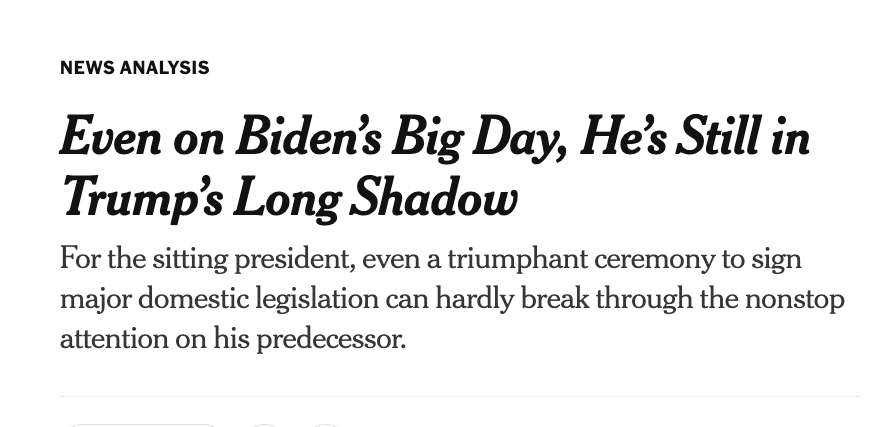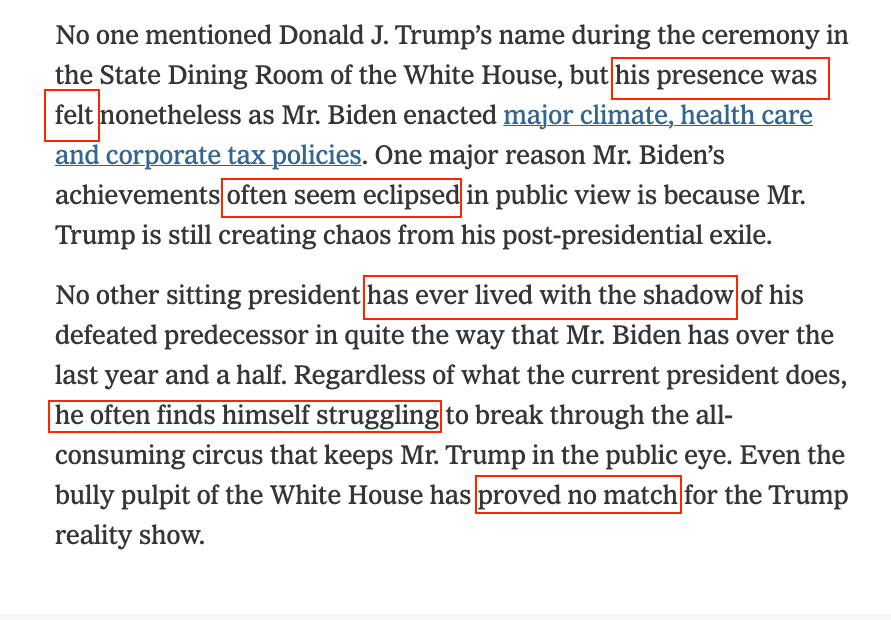Framing the News: An Example
The people pointing the spotlight, have some responsibility for where the spotlight goes.
Last spring, after the tragic death of the incisive press critic Eric Boehlert, I wrote about his (and many other people’s) emphasis on framing the news.
Framing is the idea that the assumptions behind the presentation, emphasis, and selection of stories are generally far more important than usual indicators of “bias,” overt as they might be.
This post is a quick reaction to a story this evening in the New York Times illustrating the framing points that Eric Boehlert and others have been writing about.
Here is a headline on the paper’s site right now:
Why does this deserve notice?
The minor issue is presenting as neutral, observable fact what is in reality the writer’s or editor’s judgment and assessment. In this case, that Biden remains in “Trump’s long shadow” and that his major legislative success “can hardly break through” a focus on Trump—in a story whose own framing is part of making it harder for Biden’s legislative success to “break through.”
Writers and editors can of course make their own assessments of what matters, and why. I do it all the time, including right now. But they should own them, and make their case.A related, larger issue is that a “news analysis” of why Trump gets so much attention, gives him more attention.
An even larger issue is the instinctive reduction of public life to who’s up/who’s down politics, which most reporters (including me) find fascinating. This is as opposed to the way public decisions affect households and communities, which most people care about much more.
Biden today signed a bill that appears to be the biggest forward movement on climate policy in decades; that will limit health care costs for many people; that corrects the historic mistake of not letting Medicare negotiate drug prices; that increases some corporate taxes; that by most reckoning will lower the federal deficit; that by most reckoning will create many more jobs; that was eked out through a 50-50 Senate (whose 50 included Manchin and Sinema); and so on.
You can oppose this bill, as all Republican Senators did. Or you can find it lacking, as many progressives do. But by any normal standards — as Barack Obama said in a tweet this evening — it is a BFD.
Yet one that can “hardly break through” nonstop attention to Trump. According to an article directing its attention toward Trump.
The people pointing the spotlight, have some responsibility for where the spotlight goes.
Framing: line by line.
The actual argument of the piece deserves notice, apart from the headline and presentation. Here are the set-up passages in the second and third paragraphs.
I’ve highlighted the parts on which the story depends. They are either passive-voice (“presence was felt” “seem eclipsed”), or of the “a picture emerges” variety. The latter is a familiar journalistic technique, of asserting something as true without coming out and saying so. Watch for it in stories: “From 15 interviews with the governor’s staff, a picture emerges…” (Rather than, “After 15 interviews with the governor’s staff, I am convinced…”) In this story, it shows up as “finds himself struggling”, “lived with the shadow,” “proved no match.”
It is as if I said right now: “This story often finds itself struggling to keep issues in perspective.” “Its framing has proved no match for the realities of our times.” “It lives in the shadow of past politicized coverage.”
I don’t know the editors of this piece, and there is no point in naming the writer. It’s an institutional question. But if you wonder what it means to “frame” the news, it means this.





The reporter had news right in front of him, but was determined to talk about something else.
Excellent piece - thank you for writing this. The loss of Eric Boehlert has truly damaged the integrity of journalism in the United States - a field under unprecedented pressure and attack, both financially and politically. Although others leaving comments have speculated as to why the New York Times keeps showing that it's addiction to Trump harms its actual news coverage (I remember Boehlert writing "They miss him"!) I'm still wondering just why that paper, out of all of them, keeps doing this. Something that a media critic needs to investigate and determine. When I first read the Baker piece, I commented on Twitter: "Someday, as students review the archives to study one of the most historic and consequential U.S. legislative measures in the 21st century, they'll come across this piece and say: Oh, that's from Peter Baker - he just missed the point."